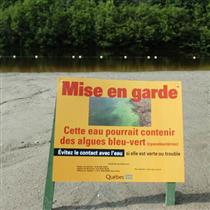 Les plus grands lacs du globe se réchauffent
Les plus grands lacs du globe se réchauffentAgence France-Presse
Washington
La Presse
Les plus grands lacs du globe se réchauffent depuis 25 ans, surtout dans l'hémisphère nord, en réaction au réchauffement du climat, selon des prélèvements de températures effectués avec des satellites par des chercheurs de la Nasa dont les travaux sont publiés mardi.
En moyenne, le mercure est monté de 1,23 degré Celsius par décennie à la surface de ces 167 lacs et de jusqu'à trois degrés pour ceux se trouvant aux plus hautes latitudes de l'hémisphère nord, selon ces scientifiques du «Jet Propulsion Laboratory» (JPL) de l'agence spatiale américaine à Pasadena (Californie, ouest).
«Notre analyse offre une nouvelle source indépendante de données évaluant l'impact du changement climatique» dans le monde, souligne Philip Schneider du JPL, principal auteur de cette communication parue dans la dernière édition du journal Geophysical Research Letters. PLUS >>>
*******
Lakes warming faster than airCBC
A first-of-its-kind NASA study is finding that cool lakes are heating up — even faster than air.
Two NASA scientists used satellite data to look at 104 large inland lakes around the world and found that on average they have warmed 1.1 degrees (Celsius) since 1985. That's about 2½ times the increase in global temperatures in the same time period.
Russia's Lake Ladoga and America's Lake Tahoe are warming significantly and the most, said study co-author Simon Hook, a scientist at the Jet Propulsion Lab in Pasadena, Calif. Tahoe has heated up by 1.7 degrees since 1985, while Ladoga has been even warmer, going up by 2.2 degrees.
The study was published Wednesday in the journal Geophysical Research Letters. MORE >>>
*******
Global Warming Burning Lakes?
Rising water temperatures threaten water quality, species survival
Richard A. Lovett
National Geographic
A loss of oxygen and the deterioration of food chains have transformed Africa’s Lake Tanganyika and Russia’s Lake Baikal. Scientists have pointed to global warming, and now a new study finds that a similar fate may be in store for many of the world's freshwater bodies.
In the last 25 years, the world's largest lakes have been steadily warming, confirms the new study, some by as much as 4°F (2.2°C). In some cases that is seven times faster than air temperatures have risen over the same period.
It's an important find, scientists say, because lake ecology can be extremely temperature-sensitive. "A small change in temperature can have quite a dramatic effect," says study author Simon Hook, a geologist and remote sensing expert at NASA's Jet Propulsion Laboratory (JPL) in Pasadena, California. MORE >>>





Aucun commentaire:
Publier un commentaire